La lactancia materna. Mejor para el bebé. Mejor para la mamá. QUESTIONS AND ANSWERS ABOUT BREASTFEEDING
Why should I breastfeed? top
Here are just some of the many good reasons why you should breastfeed your baby:

More information on the Benefits of Breastfeeding:
www.womenshealth.gov/breastfeeding/index.cfm?page=227
How long should I breastfeed? top
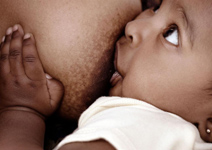
Babies should be fed with breast milk
only – no formula – for the first six months of life. The longer a mom and baby breastfeeds, the greater the
benefits are for both mom and baby. Ideally, babies
should receive breast milk through the first year of life, or for as long as
both you and your baby wish. Solid foods can be added to your baby’s
diet, while you continue to breastfeed, when your baby is six months old. For at
least the first six months, breastfed babies don't need supplements of water,
juice, or other fluids. These can interfere with your milk supply if they are
introduced during this time. One of the best things that only you can do is to breastfeed your baby for as long as possible.
How do I know that my baby is getting enough milk from breastfeeding? top
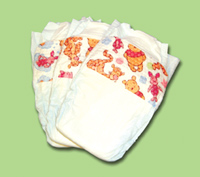
In the first few days, when you're in the hospital your baby should stay with
you in your room if there are no complications with the delivery or with your
baby's health. The baby will be sleepy. Don't expect the baby to wake you up
when he or she is hungry. You will have to wake the baby every one to two hours
to feed him or her. At first you will be feeding your baby colostrum, your first
milk that is precious thick yellowish milk. Even though it looks like only a
small amount, this is the only food your baby needs. In the beginning, you can
expect your baby to lose some weight. This is very normal and is not from
breastfeeding. As long as the baby doesn't lose more than 7 to 10% of his or her
birth weight during the first three to five days, he is getting enough to
eat.
You can tell your baby is getting enough milk by keeping track of the number
of wet and dirty diapers. In the first few days, when your milk is low in volume
and high in nutrients, your baby will have only 1 or 2 wet diapers a day. After
your milk supply has increased, your baby should have 5 to 6 wet diapers and 3
to 4 dirty diapers every day. Consult your pediatrician if you are concerned
about your baby's weight gain. You should visit your pediatrician between three to five days after your baby's birth, and then again at two to three weeks of age.
This chart shows the minimum number of diapers for most babies.
It is
fine if your baby has more.
|
Baby’s Age
|
Wet Diapers
|
Dirty Diapers Color and Texture
|
|
Day 1 (birth)
|
1 |
Thick, tarry and black
|
|
Day 2
|
2 |
Thick, tarry and black
|
|
Day 3
|
3 |
Greenish yellow
|
|
Day 4
|
5 - 6
|
Greenish yellow
|
|
Day 5
|
5 - 6 |
Seedy, watery mustard color
|
|
Day 6
|
5 - 6 |
Seedy, watery mustard color
|
|
Day 7
|
5 - 6 |
Seedy, watery mustard color
|
After you and your baby go home from the hospital, your baby still needs to eat about every one to two hours and should need several diaper changes. You still may need to wake your baby to feed him or her because babies are usually sleepy for the first month. In the early weeks after birth, you should wake your baby to feed if four hours have passed since the beginning of the feeding. If you are having a hard time waking your baby, you can try undressing or wiping his or her face with a cool washcloth. If your baby falls asleep while breastfeeding, you can try breast compression. As your milk comes in after the baby is born, there will be more and more diaper changes. The baby’s stools will become runny, yellowish, and may have little white bumpy “seeds.”
Overall, you can feel confident that your baby is getting enough to eat because your breasts will regulate the amount of milk your baby needs. If your baby needs to eat more or more often, your breasts will increase the amount of milk they produce. To keep up your milk supply when you give bottles of expressed breast milk for feedings, pump your milk when your baby gets a bottle of breast milk.
Is there any time when I should not breastfeed? top
A few viruses can pass through breast milk. HIV, the virus that causes AIDS, is one of them. If you are HIV positive, you should not breastfeed. If you have HIV and want to breastfeed, you can get breast milk for your baby from a milk bank.
Sometimes babies can be born with a condition called galactosemia, in which they can't tolerate breast milk. This is because their bodies can't break down the sugar galactose. Babies with classic galactosemia may have liver problems, malnutrition, or mental retardation. Since both human and animal milk contain the sugar lactose that splits into galactose and glucose, babies with classic galactosemia must be fed a special diet that is free of lactose and galactose.
Mothers who have active, untreated TB (tuberculosis) or who are receiving any type of chemotherapy drugs should not breastfeed.
If you are breastfeeding, you should not take illegal drugs. Some drugs, such as cocaine and PCP, can affect your baby and cause serious side effects. Other drugs, such as heroin and marijuana can cause irritability, poor sleeping patterns, tremors, and vomiting. Babies can become addicted to these drugs. If you smoke tobacco, it is best for you and your baby if you try to quit as soon as possible. If you can't quit, it is still better to breastfeed. You also should avoid drinking alcohol. An occasional drink is ok, but avoid breastfeeding for two hours after the drink.
Sometimes a baby may have a reaction to something you eat, but this doesn't mean your baby is allergic to your milk. Usually, if you have eaten a food throughout pregnancy, your baby has already become used to the flavor of this food. If you stop eating whatever is bothering your baby, the problem usually goes away on its own.
Some women think that when they are sick, they should not breastfeed. But,
most common illnesses, such as colds, flu, or diarrhea, can't be passed through
breast milk. In fact, if you are sick, your breast milk will have antibodies in it. These antibodies will help protect your baby from getting the same
sickness.
Is it safe to take medications while breastfeeding? top
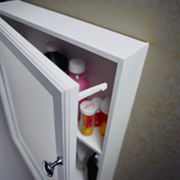
Always talk with your doctor before taking any medications. Most medications pass into your milk in small amounts. If you take medication for a chronic condition such as high blood pressure, diabetes or asthma, your medication may already have been studied in breastfeeding women, so you should be able to find information to help you make an informed decision with the help of your doctor. Newer medications and medications for rare disorders may have less information available. The American Academy of Pediatrics has information about many prescription and over-the-counter medications posted on their web site at: www.aap.org.
More information on medications and breastfeeding:
www.womenshealth.gov/breastfeeding/index.cfm?page=235
Can I breastfeed if my breasts are small? top
Of course! Breast size is not related to the ability to produce milk for a
baby. Breast size is determined by the amount of fatty
tissue in the breast, not by the amount of milk. Most women, with
all sizes of breasts, can make enough milk for their babies.
Will breastfeeding keep me from getting pregnant? top
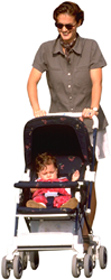 When you breastfeed, your ovaries can stop releasing eggs,
making it harder for you to get pregnant. Your periods can also stop. But, there
are no guarantees that you will not get pregnant while you are nursing. The only
way to make sure pregnancy does not occur is to use a method of birth control.
If you want to use a birth control pill while breastfeeding, the safest type is the
"mini-pill." However, talk with your doctor or nurse about what
birth control method is best for you to use while breastfeeding. When you breastfeed, your ovaries can stop releasing eggs,
making it harder for you to get pregnant. Your periods can also stop. But, there
are no guarantees that you will not get pregnant while you are nursing. The only
way to make sure pregnancy does not occur is to use a method of birth control.
If you want to use a birth control pill while breastfeeding, the safest type is the
"mini-pill." However, talk with your doctor or nurse about what
birth control method is best for you to use while breastfeeding.
Will breastfeeding tie me to my home? top
Not at all! Breastfeeding can be convenient no matter where you are because
you don't have to bring along feeding equipment like bottles, water, or formula.
Your baby is all you need. Even if you want to breastfeed in private, you
usually can find a woman's lounge or fitting room. If you want to go out without
your baby, you can pump your milk beforehand, and leave it for someone else to
give your baby while you are gone.
More information on pumping and storing breast milk:
www.womenshealth.gov/breastfeeding/index.cfm?page=230
Can I still breastfeed when I go back to work? top
Yes! You can do it! Breastfeeding keeps you connected to your baby, even when
you are away. Employers and co-workers benefit because breastfeeding moms often
need less time off for sick babies.
More and more women are breastfeeding when they return to work. There are
many companies selling effective breast pumps and storage containers for your
milk. Many employers are willing to set up special rooms for mothers who pump.
After you have your baby, try to take as much time off as possible, since it
will help you get breastfeeding well established and also reduce the number of
months you may need to pump your milk while you are at work.
If you plan to have your baby take a bottle of expressed breast milk while
you are at work, you can introduce your baby to a bottle when he or
she is around four weeks old. Otherwise, the baby might not accept the bottle
later on. Once your baby is comfortable taking a bottle, it is a good idea to
have dad or another family member offer a bottle of pumped breast milk on a
regular basis so the baby stays in practice.
 Let your employer and/or human resources manager know that you plan to
continue breastfeeding once you return to work. Before you return to work, or
even before you have your baby, start talking with your employer about
breastfeeding. Don't be afraid to request a clean and private area where you can
pump your milk. If you don't have your own office space, you can ask to use a
supervisor's office during certain times. Or you can ask to have a clean,
clutter free corner of a storage room. All you need is a chair, a small table,
and an outlet if you are using an electric pump. Many electric pumps also can
run on batteries and don't require an outlet. You can lock the door and place a
small sign on it that asks for some privacy. You can pump your breast milk
during lunch or other breaks. You could suggest to your employer that you are
willing to make up work time for time spent pumping milk. Let your employer and/or human resources manager know that you plan to
continue breastfeeding once you return to work. Before you return to work, or
even before you have your baby, start talking with your employer about
breastfeeding. Don't be afraid to request a clean and private area where you can
pump your milk. If you don't have your own office space, you can ask to use a
supervisor's office during certain times. Or you can ask to have a clean,
clutter free corner of a storage room. All you need is a chair, a small table,
and an outlet if you are using an electric pump. Many electric pumps also can
run on batteries and don't require an outlet. You can lock the door and place a
small sign on it that asks for some privacy. You can pump your breast milk
during lunch or other breaks. You could suggest to your employer that you are
willing to make up work time for time spent pumping milk.
After pumping, you can refrigerate your milk, place it in a cooler, or freeze
it for the baby to be fed later. Many breast pumps
come with carrying cases that have a section to store your milk with ice
packs. If you don't have access to a refrigerator, you can leave it at room temperatures for:
66°-72°F for up to ten hours or 72°-79°F for up to six hours.
Many employers are NOT aware of state laws that state they have to allow you
to breastfeed at your job. Under these laws, your employer is required to set up
a space for you to breastfeed and/or allow paid/unpaid time for breastfeeding
employees. To see if your state has a breastfeeding law for employers, go to http://www.llli.org/Law/LawUS.html?m=0,1,0
or call us at 1-800-994-WOMAN (9662).
More information on pumping and storing breast milk:
www.womenshealth.gov/breastfeeding/index.cfm?page=236
www.womenshealth.gov/breastfeeding/index.cfm?page=237
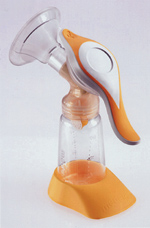 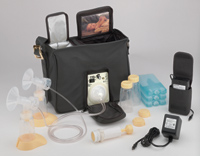 How much do breastfeeding pumps cost and what kind will I need? top How much do breastfeeding pumps cost and what kind will I need? top
Breast pumps range in price from under $50 (manual pumps) to over $200 (electrical pumps that include a carrying case and an insulated section for storing milk containers).
If you're only going to be away from your baby a few hours a week, then you can
purchase a manual pump, or one of the less expensive ones. If you're going back to
work, it is worth investing in a good quality electric pump. Some pumps can be purchased at baby supply stores or general department stores, but most high quality automatic pumps have to be purchased or
rented from a lactation consultant, at a local hospital, or from a breastfeeding
organization.
More information on breast pumps:
www.womenshealth.gov/breastfeeding/index.cfm?page=236
What are some of the reasons why a woman chooses to pump all of her breast milk for her baby? top
Some mothers choose to replace breastfeeding with pumping all of their milk to feed to their babies in a bottle. In these cases, the babies are still getting all the health benefits of human milk.
Some mothers may choose this way of feeding because they are uncomfortable with the act of breastfeeding. Others might have found that their babies had problems latching on due to a physical problem like a cleft palate, or that the babies preferred bottles after a long temporary weaning. For mothers who have sore nipples at the beginning of breastfeeding, some feel that pumping does not hurt or that pumping and bottle feeding better meets the needs of their lifestyles.
How can I breastfeed discreetly in public? top
You can breastfeed discreetly in public by wearing clothes that allow easy
access to your breasts, such as button down shirts. By draping a receiving
blanket over your baby and your breast, most people won't even realize that you
are breastfeeding. It's helpful to nurse the baby before he/she becomes fussy so
that you can get into a comfortable position to nurse. You also can purchase a
nursing cover or baby sling for added discretion. Many stores have women's
lounges or dressing rooms, if you want to slip into one of those to breastfeed.
If I decide to breastfeed, is there a right way to do so? top
There are several tips for making breastfeeding a good experience for both
you and your baby. However, you can prevent the most common challenges or
problems by following the three most important tips about breastfeeding:
Nurse early and often. Try to breastfeed your baby within
the first hour after birth. Newborns need to nurse frequently, at least
every two hours, and not on a strict schedule. This stimulates your breasts
to produce plenty of milk.
Breastfeed on demand. Since breast milk is more easily digested than formula, breastfed babies eat more often than bottle-fed babies. Babies nurse less often as they get older and start solid foods. Watch your baby, not the clock, for signs of hunger, such as being more alert or active, mouthing (putting hands or fists to mouth and making sucking motion with mouth), or rooting (turning head in search of nipple). Crying is a late sign of hunger.
-
Nurse with the nipple and the
areola (brown area surrounding the nipple) in
the baby's mouth, not just the nipple.
More information on tips for making breastfeeding a
good experience:
www.womenshealth.gov/breastfeeding/index.cfm?page=228
Does breastfeeding hurt? top
Breastfeeding does not hurt. There may be some tenderness at first, but it should gradually go away as the days go by. Your breasts
and nipples are designed to deliver milk to your baby. When your baby is
breastfeeding effectively, it should be calming and comfortable for both of you.
If breastfeeding becomes painful for you, seek help from someone who is knowledgeable about breastfeeding.
To minimize soreness, your baby's mouth
should be wide open, with as much of the areola (the darker area around the nipple) as far back into his or her mouth
as possible. The baby should never nurse on the nipple only. If it hurts, take
the baby off of your breast and try again. The baby may not be latched on right.
Break your baby's suction to your breast by gently placing your finger in the
corner of his/her mouth, and re-position your baby.
More information Breastfeeding Know
How:
www.womenshealth.gov/breastfeeding/index.cfm?page=228
More information on Coping with Breastfeeding
Challenges:
www.womenshealth.gov/breastfeeding/index.cfm?page=229
Can I give my baby a pacifier if I breastfeed? top
Most breastfeeding counselors recommend avoiding bottle nipples or pacifiers
for about the first month because they may interfere with your baby's ability to
learn to breastfeed. After you and your baby have learned to breastfeed well,
you can make your own decision about whether or not to offer a pacifier.
I’ve heard that breastfed babies may not get enough vitamin D. What does this mean for my breastfed baby? top
The American Academy of Pediatrics (AAP) published a statement in April 2003 saying that some babies are at risk for vitamin D deficiency (not having enough vitamin D in their bodies) and rickets. Rickets is a bone-softening disease caused by not getting enough sunlight and/or vitamin D in the body.
Vitamin D helps your baby build strong bones. Sunlight can be a major source of vitamin D, but it is hard to measure how much sunlight your baby gets. Things like where you live, the amount of pigment in your baby's skin, how much time your baby is in the sun, and the use of sunscreens all affect how much vitamin D your baby's body can make from sunlight.
The AAP suggests that all infants, including those who are exclusively breastfed and those who are fed formula, have at least 200 International Units (IU) of vitamin D per day, starting during the first two months of life. This amount of vitamin D should be continued throughout childhood and adolescence. You can buy vitamin D supplements for infants at a drug store or grocery store. Talk with your baby’s doctor to make sure your baby gets the right amount of vitamin D.
Will my partner be jealous if I breastfeed? top
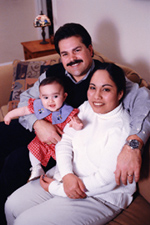 If you prepare him in advance, your partner should not be jealous. Explain
that you need his support. You can tell him the important benefits of
breastfeeding. Tell him he won't make bottles, so he'll get more rest. Be sure
to emphasize how much money he'll save too. Tell him it will cost over $300 a
month to pay for formula – money that could go to bills, savings, or a vacation.
You can tell him that breastfeeding will give his child the best start at life,
with benefits that can last well into childhood. He can help with changing and
burping the baby, sharing chores and by simply sitting with you and the baby to
enjoy the special mood that breastfeeding creates. If you prepare him in advance, your partner should not be jealous. Explain
that you need his support. You can tell him the important benefits of
breastfeeding. Tell him he won't make bottles, so he'll get more rest. Be sure
to emphasize how much money he'll save too. Tell him it will cost over $300 a
month to pay for formula – money that could go to bills, savings, or a vacation.
You can tell him that breastfeeding will give his child the best start at life,
with benefits that can last well into childhood. He can help with changing and
burping the baby, sharing chores and by simply sitting with you and the baby to
enjoy the special mood that breastfeeding creates.
More information on Family Support:
www.womenshealth.gov/breastfeeding/index.cfm?page=239
For More Information... top
You can find out more about breastfeeding by contacting the Womenshealth.gov toll-free helpline (800-994-WOMAN (9662)) or the following organizations:
Food and Drug Administration
Internet Address: http://www.fda.gov/
National Institute of Child Health and Human Development
Internet Address: http://www.nichd.nih.gov/
Women, Infants and Children (WIC) Program, USDA
Internet Address: http://www.fns.usda.gov/wic/
American Academy of Pediatrics
Internet Address: http://www.aap.org/
American College of Obstetricians and Gynecologists
Internet Address: http://www.acog.com/
La Leche League
International Phone Number(s): 800-525-3243
Internet Address: http://www.lalecheleague.org/
Wellstart International
Phone Number(s):
(619) 295-5192 (Voice)
Internet Address: http://www.wellstart.org/index.htm
You also may want to read the following Frequently Asked Questions (FAQs) fact
sheets from WomensHealth.gov:
Depression During and after Pregnancy
Pregnancy and Medications
Prenatal Care
All material contained in the FAQs is free of copyright restrictions, and may be
copied, reproduced, or duplicated without permission of the Office on Women's Health in
the Department of Health and Human Services; citation of the source is appreciated.
Current as of August 2007
|
![]() You may need to download a free PDF reader to view files marked with this icon.
You may need to download a free PDF reader to view files marked with this icon.